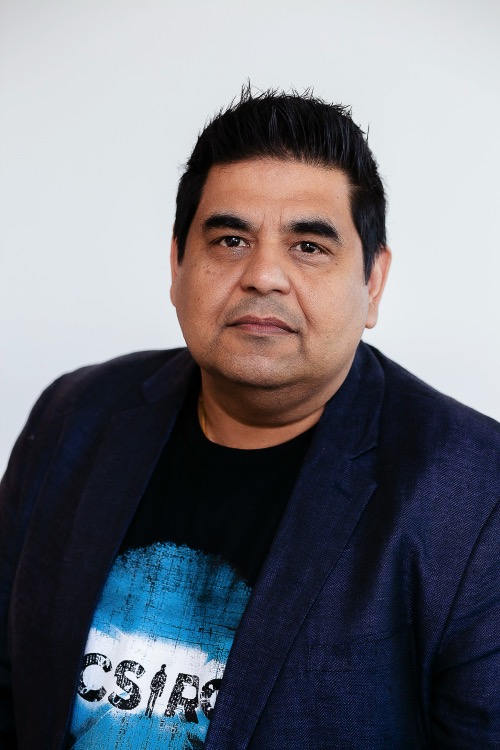Health Informatics Knowledge Management Conference 2025 (#HIKM2025)
Empowering Health: AI Innovations
The role of informatics, data analytics and artificial intelligence supporting evidence-based decision-making in health for improved patient outcomes.
The recent astonishing advances in AI and technologies have raised serious concerns about how Healthcare, Health Information, Knowledge Management, and our society in general will be affected. Interoperability remains a big concern as well, which has thus far, placed severe limitations on the adoption of technology into clinical practice. At our Health Informatics Knowledge Management Conference (HIKM 2025), we will explore, review and assess these changes and their effects on clinical decisions, trust, openness and the sustainability of healthcare and society.
If you have not registered your email address to get your HIKM event invitations – click here.
2025 Conference Program
Note: All times are Australian Eastern Standard Time (AEST). If you are in a different time-zone, please use this Time Zone Converter.
Day One – Tuesday, 16 September 2025
| AEST | Topic |
| 11:00 | Welcome Opening Day One |
|
11:10 |
Using Machine Learning Explainer SHAP to Improve Genomic Data Heatmap Visualisation on a Dashboard Extending Diabetes CDSS to Offloading Footwear Prescription: A Conceptual Adaptive Semantic Framework Session Chair: Pari Delir Haghighi – Monash University, Australia |
| 12:30 – 13:30 |
KEYNOTE 1: AI-Powered Healthcare Session Chair: Quang Vinh Nguyen – Western Sydney University |
| 13:30 – 14:30 |
Generating a Knowledge Graph to understand the Mechanistic Relationships between Multimorbid Diabetes, Hypertension and Kidney Diseases Introducing Digital Twin Capability Building in Healthcare through AI Powered Projects |
| 14:30 | The Prof is IN! Ask any question, share any news, suggest any ideas or make any comments! Moderator: Andrew Stranieri – Federation University, Australia |
| 15:00 | TUTORIAL 1: AI for Patient Safety: Enhancing the Health System’s Response to and Learning from Patient Harm Dr. Ying Wang and Prof. Farah Magrabi – Australian Institute of Health Innovation, Macquarie University, Australia Up to 1 in 14 patients experience preventable harm, costing health systems over USD 600 billion annually. This tutorial introduces how AI, especially large language models (LLMs), can accelerate learning from patient safety incident data. Drawing on research from Professor Farah Magrabi’s team, we demonstrate how to adapt LLMs via pretraining, fine-tuning, and retrieval-augmented generation (RAG) for incident analysis, classification, and trend detection. Participants will learn strategies for model selection, data preparation, and applying these methods to large-scale incident management systems, with case studies from patient safety and insights on scaling these methods to other domains. Session Chair: Andrew Stranieri – Federation University, Australia |
| 17:00 – 18:00 |
Recognizing Early Signs and Symptoms of Alzheimer’s Disease for Improved Digital Diagnostics: Semi-structured interviews and observational metrics Exploring Patient Safety Functions of Australian Health Information Management Professionals from the Australian Specialist Digital Health Workforce Censuses Session Chair: Georg Grossman – University of South Australia |
| 18:00 – 18:30 |
A Systematic Literature Review of Cybersecurity Approaches to Healthcare Worldwide (Poster) Towards better Event Log Preparation with Quality Optimisation for Hospital Process Mining Treatment Dashboard – a Visual Representation of Patients’ Treatment Regimens Preserving Identity and enhancing Emotional Well-Being: An AI-powered conversational Assistant for Dementia Care Multi‑Task Learning Approaches for Predicting ADMET Properties: A Review Converting a Dementia Aged-care Ward with Art-based Technologies: A Case Study Session Chair: Zhonglin Qu – Western Sydney University |
| 18:30 – 19:30 |
An Evaluation on Kinematics during different Lifting Tasks with Marker-less Vision-based Cameras Concept-Level Local Explanations of Kidney Transplant Survival Predictions by Black-Box ML Models Session Chair: Burkhard Wuensche – University of Auckland |
| 19:30 | Close of Day One |
Day Two – Wednesday, 17 September 2025
| AEDT | Topic |
| 11:00 | Opening Day Two |
| 11:05 – 12:25 | Propensity Score Estimation for Causal Inference in Observational Healthcare Studies Nabila Ramadhanti, Suryani Lim, Michal Chorev, Madhu Chetty and Fadi Charchar (Full Paper) TUG-IoT: A Mobile Integrated IoT based Timed Up and Go Test Moomal Farhad, Ronan Edge, Jacqueline Forster, Duhncan Guy, Erica Mayo, Bhavna Antony and Tanveer Choudhury (Short Paper) Semantic Encoding in Medical LLMs for Vocabulary Standardisation Samuel Mainwood, Aashish Bhandari and Sonika Tyagi (Full Paper) Hierarchical Global-To-Local Feature Selection Architecture for HDLSS Datasets: A Computational Framework for Personalized Medicine in Oncology Mostafa Mohiuddin Jalal, Paul Kennedy and Daniel Robin Catchpoole (Full Paper) Session Chair: Klaus Veil – Western Sydney University |
| 12:25 | Short Break |
| 12:30 – 13:30 | KEYNOTE 2: Generative AI in Healthcare – a Socio-Technical Challenge for Computer Scientists Designing systems that are not only powerful, but also safe, explainable, and clinically meaningful Professor Ping Yu – School of Computing and Information Technology, University of Wollongong, Australia Session Chair: Zhonglin Qu – Western Sydney University |
| 13:30 – 14:40 | An Auto-Ethnographical Analysis of Translational Digital Health Research Andrew Stranieri (Full Paper) Exploring Physicians’ Information-Seeking Behavior in the AI Era: A Survey on LLM and Knowledge Graph Perceptions Riki Bharali, Hamzah Bin Osop, Zechan Wang and Monica Lawrence (Full Paper) Roles and Functions of the Health Informatics and Health Information Technology Workforce in Australia Kerryn Butler-Henderson, Salma Arabi, Kay Nicol and Wei Wang (Short Paper) Bridging the Gap: Leveraging Retrieval-augmented Generation to better understand Public Concerns about Vaccines Muhammad Javed, Sedigheh Khademi Habibababdi, Christopher Palmer, Hazel Clothier, Jim Buttery and Gerardo Luis Dimaguila (Short Paper) Session Chair: Jadumani Singh – JR Analytics |
| 14:40 – 15:00 | The Prof is IN! Ask any question, share any news, suggest any ideas or make any comments! Moderator: Klaus Veil – Western Sydney University |
| 15:00 – 16:30 | TUTORIAL 2: Visual Analytics and Trust of Omics Data A/Prof. Quang Vinh Nguyen and Dr Zhonglin (Jolin) – Western Sydney University Omics data represent a big data problem that needs accurate visual data processing and analytics. Visual analytics of omics data could support the diagnostics and allow clinicians to tailor the treatment to the most efficacious for individuals. This tutorial serves at a practical guide that provides theoretical knowledge and illustrated applications to support big omics and data visual analytics. The materials reflect the visual analytics advancement in various health domains, such as genomics and flow cytometry analytics. To align human trust with the AI model’s actual capabilities, we interactively visualise the AI results and explain the Random Forest model with the SHAP explainer in clinical feature analysis. The tutorial is designed for participants who would like to learn or explore the important state-of-the-art technologies, methods and the underlined theories to support big omics data visual analytics. Session Chair: Andrew Stranieri – Federation Unversity, Australia |
| 16:30 – 17:30 | Training the Trainers: Building the Digital Health Capability in the Academic Workforce through DHALI Buck Reed, Salma Arabi, Kerryn Butler-Henderson, Jodie Brabin, Aathira Suvi and Judith Crockett (Full Paper) Can Artificial Intelligence Predict Glycaemic Responses to Food from Food Photographs using a Mobile App? Pari Delir Haghighi, Shunhao Li, Yuxin Zhang, Frada Burstein, Thanh-Toan Do, Daphne Flynn and Christopher Gilfillan (Full Paper) Sound Parameters for VR Masking Sound Treatment for Tinnitus Blair Mclean, David Huckle, Burkhard Wuensche and Philip J. Sanders (Full Paper) Session Chair: Georg Grossman – University of South Australia |
| 17:30 – 18:00 | Toward Non-Invasive Smart Healthcare: Assessing Elderly Motor Function Using Vision-Based Center of Gravity Estimation Zhaozhen Tong, Sinan Chen, Yuko Yamaguchi, Kumiko Ono, Masahide Nakamura (Poster) Development and evaluation of a machine learning algorithm for predicting pressure injury risk during hospitalisation Nanthakumahrie Gunasegaran, Maybelle Auw, AxoMem Singapore, Sean Whiteley, Fazila Aloweni (Poster) Cybersecurity for Medical IoT in Connected Healthcare Ecosystems: Risk Mitigation Strategies Dmitri Kharchevnikov (Poster) V-CARE: VR Cognitive Assistance and Recommendation Engine Zhengyang Feng, Jayan Chirayath Kurian, Mukesh Prasad, Nimish Biloria, Priya Saravanakumar (Poster) Augmented Reality for Immersive Clinical Data Visualization: Insights from Medical Students and Early Translational Researchers Neha Sundar Naik, Zhonglin Qu, Quang Vinh Nguyen, Simeon Simoff, Paul. J Kennedy, Daniel Catchpoole (Poster) Continuous Vital Signs Monitoring Outside Intensive Care Requires New Charts Teena Arora, Preeti Shenthikumar, Venki Balasubramanian, Andrew Stranieri, Ramanan Rajagopal, AP Suresh Kumar, Suchetha M, Poonkodi M (Poster) Session Chair: Zhonglin Qu – Western Sydney University |
| 18:00 – 19:05 | Addressing Bias and Ensuring Fairness in AI Systems for Healthcare Armita Zarnegar (Full Paper) AI in Primary Care: Insights from Family Physicians Diana Callebaut and António Trigo (Short Paper) Feasibility of Using LLMs to Automate Analysis of AI/ML Medical Device Approvals Ying Wang, Diogo Monteiro do Amaral and Farah Magrabi (Short Paper) Innovating Health- and Aged-Care – are Art-based Technologies the next Step? Sharron T, Klaus Veil and Gregor Poole (Short Paper) Session Chair: Burkhard Wuensche – University of Auckland |
| 19:05 | Conference Close |
Since 2007 HIKM is the leading high-impact conference for Health Information Science researchers across Asia-Pacific and beyond. Its Proceedings are published by the Association for Computing Machinery (ACM).
KEYNOTE 1: AI-Powered Healthcare
Dr Sankalp Khanna – CSIRO Health & Biosecurity

Pressure continues to mount on hospital systems worldwide due to ageing populations and the growing burden of chronic diseases and skills shortages. Despite words like “boom”, “bubble”, and “buzz” being used to describe the growing uptake of AI, health care continues to lag other industries in seeing sustained adoption of AI-powered solutions.
This talk discusses some of the challenges impeding AI adoption in healthcare, and the planning, development and delivery of AI-powered solutions in the Australian health landscape by the Commonwealth Scientific and Industrial Research Organisation (CSIRO), Australia’s national science agency. While describing innovation in the space of AI-powered decision support in health, the focus is on sharing the valuable lessons learnt with researchers already working on, or starting to explore this exciting area.
Speaker Bio: Dr. Sankalp Khanna is a Senior Principal Research Scientist and leads the Health Intelligence team at the CSIRO Australian e-Health Research Centre. His research is focussed on applying Artificial Intelligence and Machine Learning techniques to model, analyse, predict, simulate and optimise patient flow through Australian public hospitals; and develop explainable algorithms for delivering decision support that clinicians can interpret and trust. Solutions developed by Sankalp have helped reshape workflow and policy in hospitals in Australia and overseas. Sankalp has served as Adjunct Associate Professor at the Queensland University of Technology and Griffith University. He is a member and Treasurer of the Pacific Rim International Conference on Artificial Intelligence (PRICAI) Steering Committee, and a founding Fellow of the Australasian Institute of Digital Health.
Dr Sankalp Khanna – CSIRO Health & Biosecurity

Pressure continues to mount on hospital systems worldwide due to ageing populations and the growing burden of chronic diseases and skills shortages. Despite words like “boom”, “bubble”, and “buzz” being used to describe the growing uptake of AI, health care continues to lag other industries in seeing sustained adoption of AI-powered solutions.
This talk discusses some of the challenges impeding AI adoption in healthcare, and the planning, development and delivery of AI-powered solutions in the Australian health landscape by the Commonwealth Scientific and Industrial Research Organisation (CSIRO), Australia’s national science agency. While describing innovation in the space of AI-powered decision support in health, the focus is on sharing the valuable lessons learnt with researchers already working on, or starting to explore this exciting area.
Speaker Bio: Dr. Sankalp Khanna is a Senior Principal Research Scientist and leads the Health Intelligence team at the CSIRO Australian e-Health Research Centre. His research is focussed on applying Artificial Intelligence and Machine Learning techniques to model, analyse, predict, simulate and optimise patient flow through Australian public hospitals; and develop explainable algorithms for delivering decision support that clinicians can interpret and trust.
Solutions developed by Sankalp have helped reshape workflow and policy in hospitals in Australia and overseas. Sankalp has served as Adjunct Associate Professor at the Queensland University of Technology and Griffith University. He is a member and Treasurer of the Pacific Rim International Conference on Artificial Intelligence (PRICAI) Steering Committee, and a founding Fellow of the Australasian Institute of Digital Health.
KEYNOTE 2: Generative AI in Healthcare – a Socio-Technical Challenge for Computer Scientists
Designing systems that are not only powerful, but also safe, explainable, and clinically meaningful
Prof. Ping Yu – School of Computing and Information Technology, University of Wollongong, Australia

Abstract: Generative AI and large language models (LLMs) are advancing rapidly; however, their integration into healthcare requires more than just algorithmic progress. Unlike other domains, healthcare requires systems that clinicians can trust, regulators can explain, and patients can use with confidence. This keynote frames the challenge as a socio-technical one, where collaboration between computer scientists and clinicians is central to success. Retrieval-augmented generation (RAG) offers a practical path forward: by grounding outputs in curated clinical knowledge, it adapts to evolving models while improving transparency and explainability.
This keynote will explore how RAG can be optimised for efficiency, multimodal integration, and reduced risks of hallucination and bias. Just as importantly, it will emphasise collaboration between computer scientists and clinicians to ensure AI fits within real clinical workflows.
The aim is to move beyond technical novelty toward generative AI systems that are powerful, explainable, and clinically meaningful; tools that support, rather than replace, clinical expertise.
Speaker Bio: Professor Ping Yu is a multi-award-winning researcher and internationally recognised leader in digital health innovation. For over two decades, she has driven transformative, industry-engaged research that has advanced the digital modernisation of health and aged care in Australia and internationally. Applying a socio-technical approach, her work has shaped the design, adoption, and evaluation of digital technologies, improving clinical practice, organisational efficiency, and patient outcomes.
Her current research centres on generative AI in healthcare, building on expertise in knowledge engineering and socio-technical systems. She is pioneering retrieval-augmented generation (RAG) tools to extract insights from clinical text, support intelligent risk prediction, and transform clinical practice and patient education. Through these initiatives, Professor Yu is positioning generative AI as a catalyst for safer, more efficient healthcare delivery and more effective knowledge translation.
Posters
<posters to be uploaded here>
